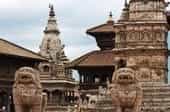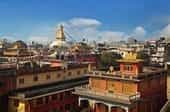Choose to take TEFL International’s certificate course in Kathmandu, and you’ll be on top of the world. Kathmandu is Nepal’s capital and home to a dozen ethnicities. The country is known for its warm-hearted citizens, its proximity to the world’s tallest mountain chain and for its devout Buddhist practices. Kathmandu is truly a magical place and anyone who’s been there will attest to this. But don’t take their word for it, sign up for the course now and come see it for yourself.
Nepal’s scenery is breathtaking. Eight of the ten highest mountain peaks in the world are in Nepal and of course it’s home to Mount Everest. While these climbs are not for the average traveler, you’re welcome to get out and experience some of the best hiking the world has to offer.
Although not rich in the monetary sense of the word, Nepal is rich in culture, history and kindness. The local people are friendly, diverse and their traditions will astound you. From the majestic Himalayan peaks to the beautiful national parks, you’ll be constantly taken back by the natural beauty of Nepal. Walk through Kathmandu’s myriad of pagodas and temples, as well as its variety of teeming markets, restaurants and bars, and you’ll know Kathmandu has something for everyone. You might eventually leave Nepal but Nepal will never leave you.
Legend has it that Kathmandu was built in the pattern of the khukuri knife—a traditional tool and weapon famous for its use by the fearless Gurkhas. At the “knife hilt” is Durbar Square, a perpetual festival surrounding a variety of monuments and temples, as well as the Royal Palace.
The city’s oldest districts extend northeast and southwest from this point. New Road is a fantastic shopping area and Kathmandu’s economy hotels are concentrated in two areas: Thamel and Jhochhen (aka: Freak Street).
Suburban Kathmandu spreads out in an easterly direction and is identifiable by the Royal Palace and the Tundikhel, or parade grounds. The majority of luxury hotels and restaurants are grouped together along Jurbar Marg, which extends south from the palace gate.
Come gain your certification with TEFL International in Kathmandu and see Nepal in a way the average traveler could only dream of.
Register now & get certified to teach english abroad!The School
TEFL International’s center in Nepal is part of a highly respected language school located in the center of Kathmandu. Our center has been open since 2008 and our trainers have extensive experience teaching ESL. We have a small cafeteria on the premises as well as a nice outdoor space for relaxing over a nice meal or snack. Restaurants and shops are conveniently located very near the school.
Accommodation
Accommodation options for your stay during your TEFL International course in Kathmandu are plentiful. We have built great relationships with numerous hotels of varying price ranges. We personally monitor and inspect each location for cleanliness and standard of service.
All options will have room service, a restaurant, green space, a balcony, as well as laundry and room cleaning services. Many hotels also have internet access and some have Wi-Fi.
Basic hotels start around US$ 407 per month. You’ll have a single room that is fan-cooled. You’ll have a single or double bed, a desk and private bath with hot water. Some rooms have a television.
Standard hotels start around US$ 559 per month. The rooms are similar to the basic hotel rooms but you can expect more in terms of service and overall standards.
Once you confirm your attendance on the course by paying your deposit, you’ll be sent a list of our accommodation options. To ensure you enjoy a large variety of options from which to choose your accommodation, we recommend you pay your deposit as early as you can. Of course, you’re always welcome to book your own hotel if you’d like.
Please don’t hesitate to contact us with any questions you have regarding accommodation in Kathmandu.
Course dates
 Coming soon...
Coming soon...Please check out our other course locations if you wish to attend a course before this one becomes available...
Course fees
The total price is divided into: deposit and balance.
The deposit may be paid via a) credit card b) Paypal c) wire transfer d) Western Union.
The balance of the course fee must be paid by cash, PayPal or bank transfer directly to the training center on the first day of the course.
US$ 600
US$ 890
Accomodation Fees
The accommodation fees are not part of the course price and you are free to choose whichever accommodation option you prefer.
You are not obliged to use the accommodation provided by the school and you are welcome to make your own accommodation arrangements. If you choose to use our accommodation, it should be paid for either by cash, PayPal or bank transfer directly to the school at the start of the course.
US$ 407








